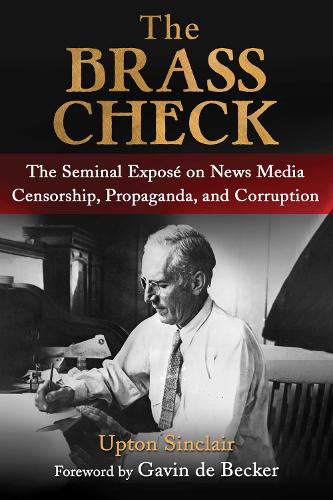
The Brass Check: The Seminal Expos on News Media Censorship and Propaganda
(Paperback)
Publishing Details
The Brass Check: The Seminal Expos on News Media Censorship and Propaganda
By (Author) Upton Sinclair
Foreword by Gavin de Becker
Skyhorse Publishing
Skyhorse Publishing
5th August 2026
4th June 2026
United States
Classifications
General
Non Fiction
News media and journalism
071.3
Physical Properties
Paperback
432
Width 140mm, Height 210mm
344g
Description
Upton Sinclair's scathing expos of early 1900s mainstream media and journalism
Written by acclaimed muck-racking journalist and author of The Junglewhich documented the inhumane conditions in meatpacking plants in the early twentieth centuryThe Brass Check isUpton Sinclair's piercing critique of mainstream media's biases in its reporting; how it was not interested in combatting misinformation, but was more heavily influenced by its wealthy owners and their own sociopolitical interests and agendas. Sinclair investigates and conjectures about the power of capitalism and money and its influence over mass media, and cites several contemporary cases, including media's involvement and perpetuation of the Red Scare, the Ludlow Massacre in 1914, the Paint Creek-Cabin Creek strike of 1912, among other examples.
It is one of six books within the Dead Hand series that Sinclair wrote to criticize various institutions and industries that cultivate and influence the fabric of American society. Within the book, Sinclair proposes a handful solutions to hold journalists and media accountable for censorship, sensationalism, and for the accuracy of the content they filter, spin, position, and distribute into the world.
Sinclair himself called it "the most important and most dangerous book I have ever written" and originally published it without registering copyright to the text to increase circulation and subsequently the book's reach to the general public. As a result, the first code of ethics for journalists was established in 1923, just a few years after the book was released. In 2022, it is more relevant than ever.
Reviews
"In 1920, Upton Sinclair, an outsider to journalism, wroteThe Brass Check, the first book exposing the press. It was this book, plus a friendship with the author lasting many years, that influenced me and the books I wrote on the press, beginning in the 1930's." George Seldes
"Though SinclairsThe Brass Checkhas been almost entirely forgotten by history, its not only fascinating but a timeless perspective. Sinclair deeply understood the economic incentives of early 20th century journalism and thus could predict and analyze the manipulative effect it had on The Truth. He exposes these matters just as he did inThe Jungleand his other muckraking exposesbut in this case, hes muckraking the muckrakers. Today, the incentives and pressures acting on the media are different but they warp our information in a similar way. In almost every substantial charge Upton leveled against the yellow press, you could, today, sub in blogs and the cable news cycle and be even more correct." The Observer
Author Bio
Upton Sinclair was born September 20, 1878. He was a bestselling American author and journalist who penned more than one hundred books, plays, and journalistic articles during the course of his career. He received the Pulitzer Prize for Literature in 1943. Time magazine called him a man with every gift except humor and silence. He died on November 25, 1968.
Gavin de Beckeris a bestsellingauthor and security specialist, primarily for governments, large corporations, and public figures.He is the chairman ofGavin de Becker and Associates, which he founded in 1978. He is the bestselling author of The Gift of Fear and Other Survival Signals that Protect Us From Violence.
